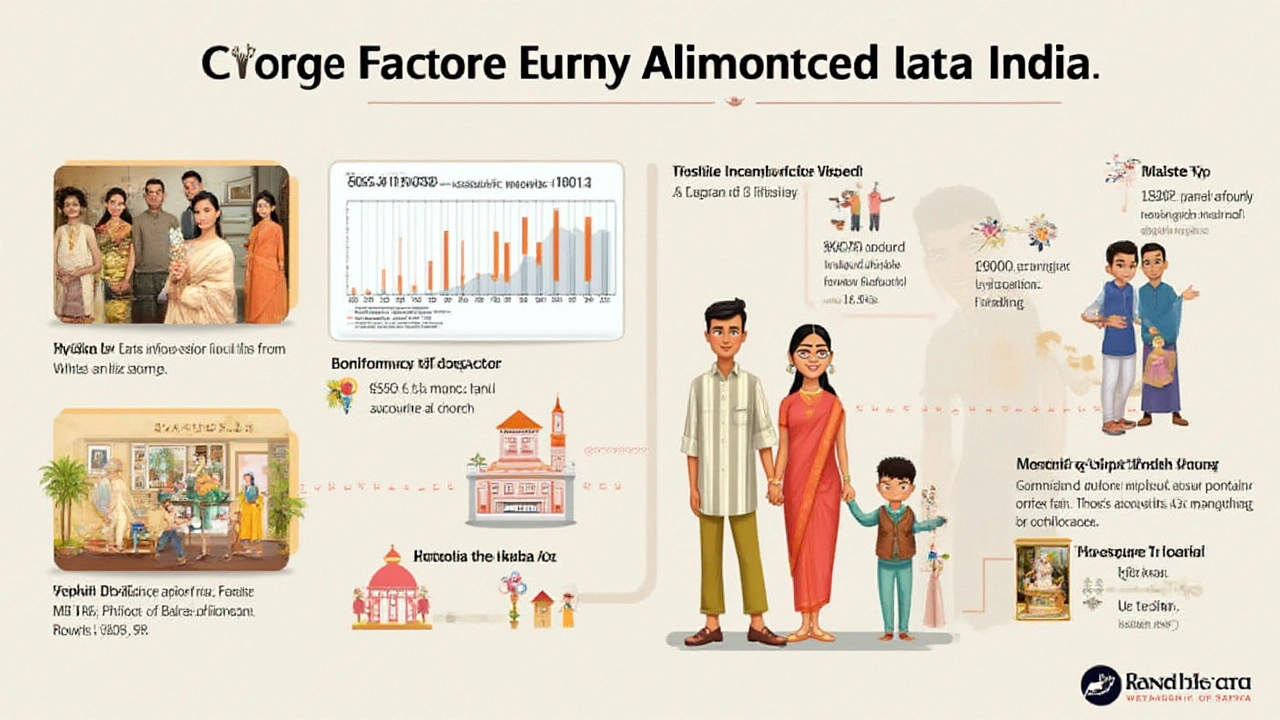If you've ever seen a heated Bollywood drama about a crumbling marriage, you've probably heard the word "alimony" tossed in with tears and shouting. But here's the real plot twist: most people have wild misconceptions about how much alimony a husband actually has to pay in India. Forget the cinema melodrama—what really happens after a breakup in a real Indian household? Money worries kick in fast. Some imagine the husband instantly hands over half his wealth. Others think only mega-rich have to pay. The truth is tangled in laws and life details. That's where we dig in today. I once watched a family friend reeling from his lawyer’s explanation, and I thought to myself, "Why isn't there a straight answer anywhere?"
What Is Alimony in India and When Is It Paid?
First, let's get something straight. "Alimony" actually means maintenance—support money paid by one spouse to another after they split or separate. In India, whether it’s called alimony or maintenance, the law cares about the same thing: can one ex afford their life, or will they have to struggle? Indian law covers all religions and communities, but the conditions and amounts can be very different depending on your background. There’s the Hindu Marriage Act, the Special Marriage Act, the Code of Criminal Procedure (yes, that old CrPC), and personal laws for Muslims, Christians, and Parsis. Sound confusing? It is.
Here's the basic situation: if the wife does not have "sufficient means" to support herself, and the husband can afford it, the court may order alimony. Some men scoff at this, thinking their wives have well-paying jobs. But guess what? Courts consider each case in detail. So even if she’s working, but her lifestyle was much higher in marriage, or if kids are involved, or if she has health issues, the court won’t ignore those.
Also, payment can be:
- Permanent alimony: Lump sum or regular payments for life or until remarriage of the recipient (wife or, technically, husband—rarely).
- Interim maintenance: Temporary support during the case proceedings—you can’t just leave your spouse penniless while fighting in court.
A lot of men are surprised that, in rare cases, a husband can also claim alimony from his wife. It’s rare because most cases involve men as breadwinners, but if the tables turn, the law is gender-neutral on paper.
How Courts Calculate Alimony for Husbands in India
Ah, the million-rupee question: how much alimony does a husband actually have to pay in India? If you were hoping for a one-size-fits-all number, sorry to burst the bubble. There's no fixed percentage, no secret universal formula. Instead, judges weigh up a stack of factors. Don’t believe any uncle who claims “it’s always 33% of monthly income.” That’s not law. Real calculation is more like putting together a jigsaw puzzle with these pieces:
- Income of both spouses: If the wife is working (or can earn), the maintenance drops. If the husband earns crores and the wife is unemployed, the amount jumps.
- Standard of living during marriage: Courts don’t want one person suffering while the other enjoys old comforts. They try to balance things.
- Age and health: If the wife is older, unwell, or unable to work due to disability, maintenance might go up. On the other hand, if she’s young and educated, it could go down.
- Duration of marriage: Marriages lasting decades usually lead to higher maintenance than a couple that was together six months.
- Children: Who has custody? Costs of education, health, and living for children are included. Child support is separate but considered at the same time.
- Assets and liabilities: If the husband has debts, the court considers that too. If he’s loaded with properties, maintenance is higher.
- Fault grounds: If one partner’s bad behavior directly caused the divorce (cruelty, adultery, desertion), this can impact the order, though it doesn’t always erase the need to pay.
Let’s lay it out with a made-up, but realistic, scenario. Ramesh earns ₹1,50,000 a month as an IT manager. His wife, Priya, is a part-time tutor making ₹20,000 monthly. No kids. Married for 8 years. The court might fix monthly maintenance anywhere between ₹25,000–₹40,000, depending on expenses and the evidence both show about spending during marriage. It’s not one-size-fits-all, but this example gives a flavor. A couple with two kids and a non-working spouse will see a bigger number.
| Factor | Impact on Alimony |
|---|---|
| Husband's Income | Higher the income, higher the likely maintenance |
| Wife's Earning Capacity | If she can earn, amount drops |
| Marriage Duration | Shorter marriage, smaller payment |
| Children’s Needs | Costs included or separate, but always a factor |
| Debts and Loans | Heavy debts can lower amount |
Remember, each case has its own flavor. Always, always get solid legal advice, not just WhatsApp forwards.

Legal Rules and Recent Court Decisions on Alimony
This is where things get juicy. Indian courts don’t shy away from tweaking rules when faced with new scenarios. Did you know the Supreme Court suggested in 2020 that “25% of the husband’s net monthly salary” could be a starting point for alimony under Section 125 of CrPC, but left it open for tweaks? Not many know this isn't binding—it's just a guideline. Lower courts have freedom to set amounts based on the facts.
Alimony rules pop up from three main places in Indian law:
- Hindu Marriage Act, 1955: Applies to Hindus, Jains, Sikhs. Says either spouse can claim maintenance after divorce or separation.
- CrPC Section 125: Gender-neutral and not religious—covers almost everyone. A wife, child, or even parents who can’t support themselves can claim support from the guy who can.
- Special Marriage Act, 1954: For inter-religion or civil marriages. Similar maintenance provisions as above.
The law doesn’t give an automatic pass to anyone cheating the system. Fake income numbers don’t fly. Courts will make both sides submit salary slips, bank records, property details, even fancy vehicles and vacation bills. Some bold folks try hiding assets by shifting money to relatives—courts are wise to this and dig deep if asked. In a famous 2021 Bombay High Court case, a man claimed he was broke but had bought a new Mercedes “for business purposes.” The judge didn’t buy it, and set alimony higher.
Muslims follow separate rules under the Muslim Women (Protection of Rights on Divorce) Act, 1986, where "mehr" (dower) is key, along with maintenance during the iddat period. But if there’s special hardship, even beyond that, courts have sometimes ordered extra support.
Tips for Husbands: How to Navigate Alimony in Indian Divorce
If reading up on all this has your heart pounding, that’s fair. But smart thinking and some prep can go a long way. Let’s run through some real-world tips I’ve seen make a huge difference:
- Don’t hide your true income. If you doctor payslips or stow cash, almost every judge spots it—or your spouse’s lawyer will. Be upfront and supply full, honest documents.
- Keep track of joint assets. Sometimes gifts, gold, FD’s, and property get twisted up in divorce. Don’t let your records get lost.
- Factor in children. If custody comes to you, make clear the living costs. If not, detail your continuing support role for the kids.
- Document your expenses. Write down all basic monthly costs: rent, loan EMIs, insurance, food, medical, even pet care (like me with Willow, my dog—these aren’t luxury extras if it’s your real life!).
- If you expect to move abroad or change your job, let the court know. Your living costs can shift fast.
- Beware "interim maintenance"—that’s the immediate, temporary support during the court fight, and it’s usually set quickly, often without deep checks. Be ready to show real hardship if you can’t pay the amount set.
- If a lump sum settlement is possible, talk it out. It can save years in court. Yes, lump sums can be huge, but ongoing monthly wars are exhausting. Many couples quietly negotiate a number and move on with life.
- Always consult a sharp family lawyer. WhatsApp and “office uncle” advice usually misses the nuances that could save you lakhs.
And just a fun fact: In India, studies have shown less than 25% of divorce cases actually end with a permanent alimony order. Far more end with mutual settlements or, sometimes, no maintenance if both partners are self-reliant. The reality is less fierce than the myth, but the numbers can still sting.

Myths, Real Stories, and What the Law Is Actually Doing
Let’s talk about the wild rumors flying around about alimony for husbands in India. I once heard a guy in a cafe complaining, “You lose half your salary straight away!” After a chat, it turns out his cousin had negotiated a one-time lump sum, far less than the wild monthly horror stories everyone fears.
Here are some persistent myths and the actual truth:
- Myth: "Men always have to pay, no matter what."
Fact: If a wife can support herself and has similar income, courts may not order maintenance at all. - Myth: "It’s always 1/3rd of your salary."
Fact: No set percentage exists in law. 25% to 33% are rough guideposts, not hard rules. - Myth: "Wives get alimony for life, even if they remarry."
Fact: Maintenance usually ends if the recipient remarries. This is true for women and, in the rare situations, for men. - Myth: "Husbands never get alimony."
Fact: Law allows it, though it’s rare. There are real cases where women earning much more have paid maintenance to ex-husbands. - Myth: "If you don’t pay, you only get a fine."
Fact: Repeated refusal to pay court-ordered maintenance can actually lead to a jail sentence.
Real-life stories show variety. One Delhi businessman with heavy monthly expenses was ordered to pay temporary support, but the final court settlement dropped the amount when it turned out his ex-wife had under-reported her own income. On the flip side, a Kolkata-based teacher with a disabled wife was required to pay significant percentage of his income even after retirement.
Data from the Ministry of Law & Justice reflects that while divorce rates are up, alimony cases are not exploding as fast because more couples are settling up front, either because of mutual agreement or mediation cells. That said, the legal maze is tricky, so always tread carefully and get good advice before making any financial moves, especially when mental peace—like Willow curling up at my feet—matters just as much as money.
